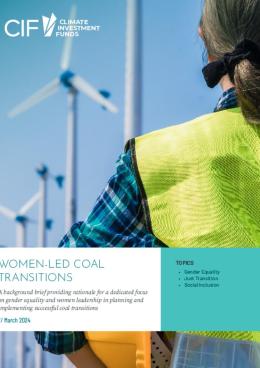Women-led coal transitions
There is an urgent need for a transition away from coal and towards clean energy solutions. Coal power plants produce a fifth of global greenhouse gas emissions — more than any other single source. Meeting the Paris Agreement’s ambitious goal of restricting global warming to 1.5°C above pre industri
...There is an urgent need for a transition away from coal and towards clean energy solutions. Coal power plants produce a fifth of global greenhouse gas emissions — more than any other single source. Meeting the Paris Agreement’s ambitious goal of restricting global warming to 1.5°C above pre industrial levels requires a transition away from coal and towards clean energy solutions. The transition will entail the need for investments in renewable projects that not only protect the environment but also ensure sustainable livelihoods for all stakeholders affected. The type of investments and projects that are envisioned under “Energy Transition” include operations targeting the closure of coal-powered plants, the establishment of new transmission lines, and the adoption of renewable energy sources such as biomass, green hydrogen, wind, and solar.
The transition from coal to clean energy poses major social, economic, and political challenges, particularly for women, and requires a transformative approach to promote a sustainable transition. Women, and other disadvantaged social groups, such as Indigenous people, persons with disabilities, minoritised groups, and migrant workers, are disproportionately affected by the transition due to pre-existing gender and socio-economic inequities. Nevertheless, the transition also creates opportunities to challenge deeply entrenched social and gender disparities and restructure prevailing power relationships. To take advantage of these opportunities calls for a transformative approach, built on a deep understanding of the barriers to change and a rigorous and determined effort to address them.
Canada
We welcome your feedback
Your input matters. Help us improve the CIF website by completing a brief survey. It will only take two minutes and will support our ongoing efforts to serve you better.

